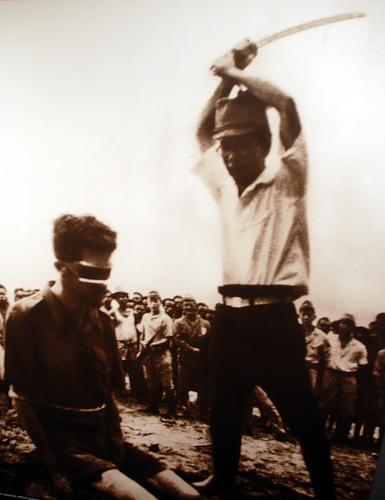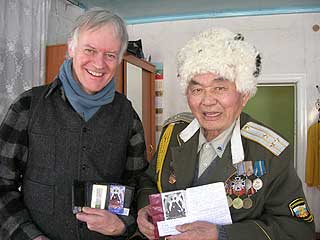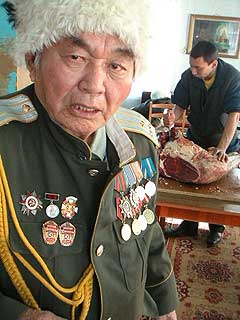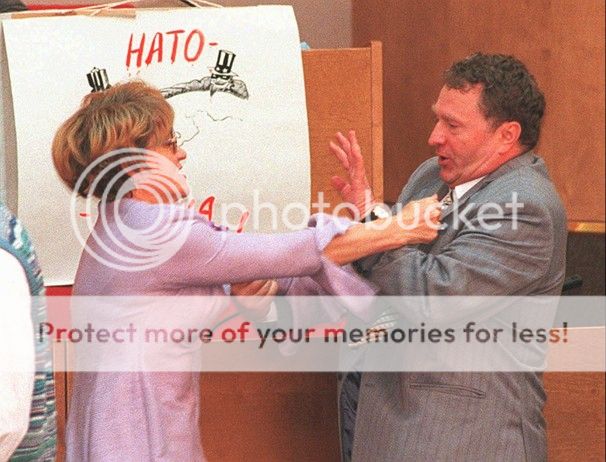PART SIXTY FIVE: A SHEEP IN WOLF'S CLOTHING
PART SIXTY FIVE: A SHEEP IN WOLF'S CLOTHING
Well, sooner or later Zhirinovsky would start acting like…Zhirinovsky. This update is based on the famous fight between Zhirinovsky and a female opposition leader that occurred in 1995. As I mentioned earlier, this really sunk Zhirinovsky’s political career. One news report I read talked about a liter line of women outside the door of the LDPR office in Moscow the day after, there to renounce membership in the party. But even so, that occurred when he was just an opposition party member in OTL. What would happen if it occurred in TTL, with Zhirinovsky as president? And what is happening to the vice president? He now “owns” what amounts to the entire state media apparatus, and uses his position to ensure his networks gets all the advantages over the opposition (such as making sure only the VGTRK is the only network allowed to cover the President’s speech to the Duma). But how is that going over with the junta or even the reformers?
BTW, special shout out to Dan1988 for helping me with some questions I had about the VGTRK! Thanks Dan!
Some of the new names in this update:
The VGTRK state television:
http://en.wikipedia.org/wiki/All-Russia_State_Television_and_Radio_Broadcasting_Company
Rossiya 1 (Russian State media channel):
http://en.wikipedia.org/wiki/Rossiya_1
Fausto Bertinotti (Italian Communist leader):
http://en.wikipedia.org/wiki/Fausto_Bertinotti
Delo (Slovenia Newspaper):
http://en.wikipedia.org/wiki/Delo
Lubyanka Building (KGB headquarters):
http://en.wikipedia.org/wiki/Lubyanka_Building
Lega Nord:
http://en.wikipedia.org/wiki/Lega_Nord
National Alliance (Italy):
http://en.wikipedia.org/wiki/National_Alliance_(Italy)
Silvio Berlusconi:
http://en.wikipedia.org/wiki/Silvio_Berlusconi
Lamberto Dini:
http://en.wikipedia.org/wiki/Lamberto_Dini
MTV’s Jersey Shore show:
http://en.wikipedia.org/wiki/Jersey_Shore_(TV_series)
Yevgenia Tishkovaskya:
http://www.independent.co.uk/news/world/vlad-the-outrageous-shows-off-his-freudian-tendencies-takes-another-whiff-of-oxygen-struts-his-sexist-stuff-1601131.html
And an article about the OTL fight between Zhirinovsky and Tishkovaskya:
http://news.google.com/newspapers?nid=1876&dat=19950914&id=t0goAAAAIBAJ&sjid=Uc8EAAAAIBAJ&pg=6776,2740440
UIS Presidential Candidate Vladimir Putin in an interview with the BBC on August 1, 2011.
Discussing his removal as head of KGB in 1995 and his subsequent entry into politics.
BBC: Mr. Putin, your removal as head of the KGB by UIS President Yuri Luzhkov ushered in your entry into politics. However, the image of you being escorted out of the Lubyanka Building in handcuffs haunted you during your initial campaign in 1996.
Putin: Yes. Andrei Zavidiya couldn’t get enough of that image. He covered every newspaper and every news broadcast with it. For too many Russians the image of the head of the KGB being escorted out of the building in handcuffs was simply long overdue. They loved it, even if they didn’t have any issue with me personally. And Zavidiya was emerging as a very powerful person because of his willingness to sell his soul for the right price.
BBC: What do you mean ‘sell his soul’?
Putin: He initially supported Alexander Lukashenko, but once he started taking over the state controlled media all he could think about was profits. Before long his Rossiya 1 news station was seen as the most reliable news network in the country. Mainly because they would broadcast anything…as long as it was sensational and would help sell advertisements. He even began to cover Vladimir Zhirinovsky again by late 1995. He hated him with a passion, but suddenly he realized that Zhirinovsky sold newspapers and advertisements, so he decided to sell out his principles and ended his media blackout on Zhirinovsky.
BBC: So you are saying that one of the richest men in the UIS secretly harbored a dream of bringing back communism, but changed his mind only after he became a billionaire?
Putin: Yes. He soon became obsessed with money and profit. And he would put anything on television, as long as it made money. He would sell out his own mother if he thought it would bring good ratings. Sadly, as other newspapers and news stations would tout a particular political line, Zavidiya would attack anyone, he didn’t care! Unfortunately this allowed him to gain credibility. Can you imagine that? The man known for putting pure filth on television still has more credibility than his opponents! Talk about a sad state of affairs in the UIS. What have we come to when a whoremonger like Andrei Zavidiya is seen as more trustworthy than a man like me?
GOVERNING COALITION IN ITALY COLLAPSES
By John Turner
New York Times
Published: April 19, 1995
Italy's Government coalition collapsed today as Prime Minister Silvio Berlusconi announced his resignation amid accusations of violating UN sanctions on the Union of Independent States.
In a press release President Oscar Luigi Scalfaro said he was likely to install an interim government until new elections, most likely in June. Economist Lamberto Dini is expected to be appointed the new Prime Minister.
Berlusconi’s government was plagued by in-fighting after his election in May of 1994.
Forming a coalition with Lega Nord and the National Alliance, Berlusconi’s government was seen as fragile from the moment he took office. Berlusconi’s refusal to sell his holdings in his media company
Fininvest remained a source of friction with many in the country. However, it was the revelation that he was attempting to purchase the Slovenian newspaper
Delo in conjunction with Russian media mogul Andrei Zavidiya (the current Vice President of Russia) that proved too much for the fragile coalition.
“I don’t doubt that Berlusconi will find a way to wiggle out of getting prosecuted for violating international law,” commented Fausto Bertinotti, leader of the Communist Refoundation Party, “but I do hope this ends his political career. I can’t imagine the Italian people being able to forget that this man was willing to partner up with Vladimir Zhirinovsky’s Vice President just to make a little bit of money.”
Italian American group calls on MTV to cancel upcoming “Jersey Shore” television show
November 25, 2009
By Paul Rosi, Newark Star-Ledger
In a move that surprises nobody, MTV's forthcoming series "Jersey Shore" is under attack from an Italian-American group over what it calls “degrading and offensive stereotypes of Italians.”
UNICO National, which is regarded as one of the largest Italian-American service organizations in the country, has asked MTV to abandon next week’s premier of "Jersey Shore.”
Few anticipated anything less after MTV released a promo spot of the upcoming show with the promise that “Jersey Shore” would feature the "hottest, tannest, craziest Guidos" on the (Jersey) shore. "They keep their hair high, their muscles juiced and their fists pumping all summer long!"
UNICO President Andre’ DiMino responded by calling the show “trash television.”
“This is nothing short of an assault on Italian-American culture,” DiMino said in a press release, “It serves no purpose other than to demean Italian-Americans, to portray them as cheap caricatures of outdated stereotypes.”
An MTV spokesperson responded by telling the Star-Ledger that the characters featured on the show “take pride in their ethnicity,” a statement that DiMino ridiculed.
“This is poised to become the single most offensive television show since “Father, My Boyfriend is a Chechen” premiered on Russian television in 1997,” DiMino said. “And I might add that the characters in that show “took pride” in their ethnicity as well.”
“Father, My Boyfriend is a Chechen” premiered on Rossiya 1 in the summer of 1997 and became an instant sensation in the UIS. However, the show was often referred to as the low point of Russian television. Russian media mogul Andrey Zavidiya, the former Vice-President of Russia, received criticism from both the right and the left in the UIS for allowing the show to air. Many former communists regarded the show as an example of the growing influence of capitalism in the country, accusing Zavidiya of putting profits over quality. Critics from the Liberal Democratic Party attacked what they considered a sympathetic portrayal of the Chechen characters during a point upon which the country was at war with the breakaway Republic of Chechnya, even if they often were portrayed in a demeaning and stereotypical fashion. However, as appears to be the case with “Jersey Shore,” Zavidiya used the controversy to boost interest in the show.
“I assume MTV is doing the same thing that the Rossiya 1 did back in 1997,” DiMino added, “they want controversy so people will tune in to see what all the fuss is about. But I cannot in good conscience sit back and say nothing about this trash that they are about to air.”
“My Russia- An Autobiography by former Russian Prime Minister Gennady Burbulis”
Published by Interbook, © 1998
CHAPTER SIXTY ONE
As Vice President Zavidiya walked into the room he seemed oblivious to the impact his presence had on everyone. Regardless of if they were a reformist or a hardliner, a politician or a general, they all hated him. But he was oblivious to this as he smiled and patted people on the shoulder. Just last night the VGTRK released a poll indicating that the support for the war in Chechnya was “less than 35%” and that “over 55% of Russians felt that the Party for a Free and Democratic Russia had abandoned its principles by partnering up with the Liberal Democratic Party.” He single handedly angered both the military and the reformists with that report. There was already indications that the fragile coalition in the Duma was about to collapse ahead of parliamentary elections in December. Vladimir Putin had already registered a political party of his own, The Unity Party, which was already taking steps to rally disenfranchised communist and Liberal Democrats to the fold. If he could win enough seats in the legislative elections then he was poised to become a front runner in 1996 during the presidential election.
“Mr. Vice President,” General Sergei Stepashin said coldly as Zavidiya took a seat, “I am somewhat surprised to see you here…considering you were not invited.”
“What are you talking about?” Zavidiya said with a chuckle, “I’m Vice President, why wouldn’t I be at a cabinet meeting?”
“Because we are discussing sensitive issues in regards to Chechnya,” General Stepashin replied forcefully, “and quite frankly, nobody wants what is discussed here to be all over the news tomorrow night.”
“Don’t be silly,” Zavidiya said with a laugh, “so what is the plan with regards to Chechnya?”
The room was silent as Zavidiya looked around. Suddenly the smug look on his face disappeared.
“You can’t be serious,” he said nervously, “I am Vice President of the Russian Republic! I can’t just be told to leave!”
“Mr. Vice President,” General Lebed said coldly, “you have clearly shown that you regard your position as Vice President as a part time job. I can assure you that we will be able to conduct this meeting without you. We all feel it is in the best interests of the country that we don’t put you in a position in which you are forced to choose between your duties to your country and your duties to your company. Quite frankly, we all know where your loyalties lay in such a scenario.”
Zavidiya looked wounded at the accusation that he cared more for his company than for the country. He turned to me with a desperate look.
“Gennady,” he said frantically, “I know you believe in a free media, in an open press! I know you do! We may not agree on much but we agree on that! Don’t let this happen! You owe it to the country! We cannot let the press be silenced just because we don’t tout the party line. We cannot!”
I said nothing as I stared at him. I didn’t believe he cared about a free press. He just figured out that a free press meant more money for him. He was grasping at straws.
“I was only doing my duty!” he yelled at me.
“I know,” I said firmly, “but you need to leave.”
The Vice President looked around the room one more time, hoping and praying that someone would speak on his behalf. He simply couldn’t believe that we wouldn’t bow down to him any more. That we no longer cared about what he was going to say about us anymore in the news. He stood up sadly as he slowly walked out of the room. As he closed the door behind him I spoke up.
“All right then,” I said, “we need to shore up the coalition and bring Mikhail Arutyunov back into the fold. I think the best situation is to have President Zhirinovsky speak to the Duma next week. If he can do what he did after the failed coup perhaps we can avert disaster in December and hold this coalition together.”
Russian President punches female deputy during speech to Duma; coalition government “dead” according to opposition leader
By Jack Horn
Denver Post – September 14, 1995
Vladimir Zhirinovsky fights with a female deputy during his speech to the Russian Duma yesterday
(MOSCOW, UIS) In a scene that looks like it came out of the pages of professional wrestling, Russian President Vladimir Zhirinovsky erupted into a sexist tirade against opposition lawmaker Yevgenia Tishkovskaya before attacking her during the live broadcast on Russian state television. The fight between Zhirinovsky and Tishkovskaya (a female deputy) has created a firestorm in the UIS, with UIS President Yuri Luzhkov calling it a “national embarrassment.” The incident started when Tishkovskaya called Zhirinovsky a “liar” during his speech in front of the Duma. Zhirinovsky made claims that NATO troops were “occupying” southern Chechnya, a claim that caused many of the liberal members of his coalition government to groan and boo at the statement. Zhirinovsky, however, singled out Tishkovskaya, saying that she needed a man to “put something in your mouth to shut you up,” before grabbing his crotch and saying that he “had something that would work.”
The statement brought many of the lawmakers to their feet in protest, and caused Tishkovskaya to walk up to the president and slap him across the face on national television. The Russian president looked stunned at the brazen act of courage from the opposition lawmaker, but as members of the opposition party began to cheer Zhirinovsky became enraged. The Russian president grabbed Tishkovskaya by the hair and threw her to the ground and began punching her before liberal lawmakers pulled him off the deputy. However, after Zhirinovsky was dragged off Tishkovskaya, the female lawmaker threw a punch that landed on the face of the Russian President, blooding his nose.
“He is a paper tiger,” commented opposition lawmaker Gleb Yakunin, “a bully who gets beat up by women! He is nothing more than a sheep in wolf’s clothing and we exposed to the world that he is a coward and a bully!”
Opposition leader Mikhail Arutyunov told Russian State television station that he considered the coalition between his party and the Liberal Democratic Party “dead.” Prime Minister Gennady Burbulis also called the coalition “damaged beyond repair” and hinted that he may also leave the Liberal Democratic Party. Vice President Andrei Zavidiya did not comment on the incident, but his television network, Rossiya 1 (which held the exclusive rights to broadcast the speech and owns all rights to the footage), released a statement indicating that fight was the “highest rated event ever shown on Russian television” and added that both Tishkovskaya and Zhirinovsky were slated to appear together in an interview on the Russian news program Vesti the following night.







